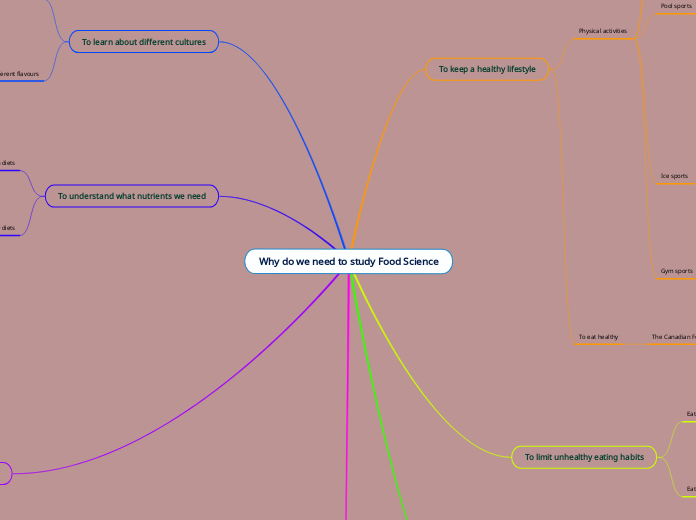Why do we need to study Food Science
To keep a healthy lifestyle
Physical activities
Running
Sprints
Lower body
Cardio
Long Distance
Lower Body
Cardio
Walking
Speed Walking
Lower body
Cardio
Pool sports
Swimming
Lungs
Whole body
Cardio
Water polo
Lungs
Cardio
Whole body
Synchronized swimming
Lungs
Cardio
Whole Body
Ice sports
Hockey
Cardio
Whole body
Figure Skating
Cardio
Whole body
Speed Skating
Cardio
Whole body
Gym sports
Weight Lifting
Whole body
Machines
Whole body
To eat healthy
The Canadian Food Guide
Veggies
Protein
Whole Grain
To limit unhealthy eating habits
Eating fast food too often
McDonalds
Burger King
A&W
Eating the normal amount in the day
Breakfast
Lunch
Dinner
Snacks
Being able to know how to read nutrion labels
Calories per ___
Fat percentages
Sugar percentages
Sodium percentages
To learn about different cultures
Etiquette while eating
Who eats first
What utensils
Sit on the ground or at a table
Different flavours
What seasonings cultures put in their food
Balkan seasonings
Asian seasonings
Caribean seasonings
Middle Eastern
To understand what nutrients we need
Participating in diets
Keto
Paeo - vegan
Carnivore diet
To limit certain ingredients from our diets
Limiting sugar intake
Limiting caffeine intake
Limiting salty food intake
Understanding the deterioration of food
When it is safe to eat food
Not when the food is moldy
Not after milk is left out
How to identify deterioration
Mold
Milk chunks
Bruises on apples
Causes of food deterioration
Temperature
Milk not in the fridge
Meat not in the freezer or fridge
Not sealed
Bread not sealed creates mold/stale
Not used soon enough
bananas not eaten fast enough
What eating certain foods does for your body
Protein helps build muscle
Dairy helps bones
Vegetables are good for your eyes
Fiber makes you use the washroom
